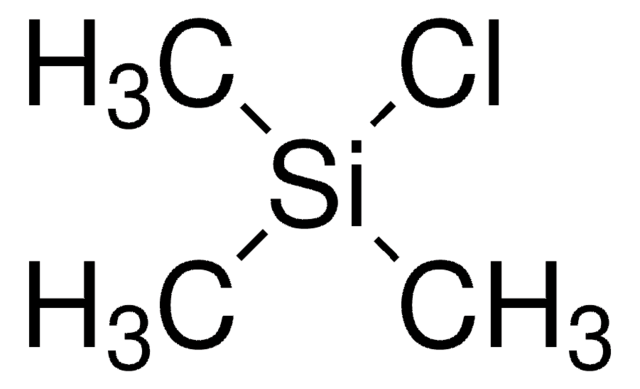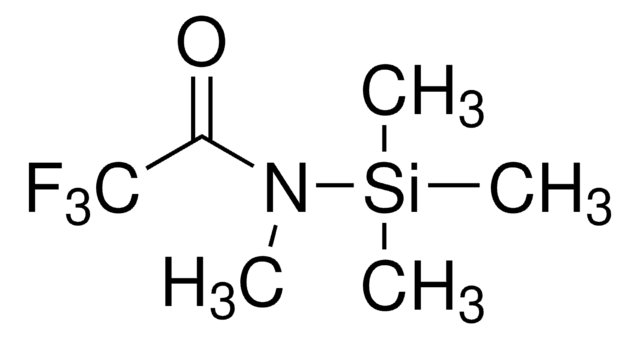52619
Hexamethyldisilazane
for GC derivatization, LiChropur™, ≥99.0% (GC)
Sinonimo/i:
HMDS
About This Item
Prodotti consigliati
Grado
for GC derivatization
Livello qualitativo
Saggio
≥99.0% (GC)
Stato
liquid
Qualità
LiChropur™
Impiego in reazioni chimiche
reagent type: derivatization reagent
reaction type: Silylations
tecniche
gas chromatography (GC): suitable
Indice di rifrazione
n20/D 1.407 (lit.)
n20/D 1.408
P. ebollizione
125 °C (lit.)
Stringa SMILE
C[Si](C)(C)N[Si](C)(C)C
InChI
1S/C6H19NSi2/c1-8(2,3)7-9(4,5)6/h7H,1-6H3
FFUAGWLWBBFQJT-UHFFFAOYSA-N
Cerchi prodotti simili? Visita Guida al confronto tra prodotti
Descrizione generale
Applicazioni
It may be used as a derivatizing reagent for the analysis of bioamines and their acidic metabolites, phenol, hydroquinone and catechol in urine samples, mixtures of free fatty acids and metal soaps in paint samples using gas chromatography/mass spectrometry (GC/MS).
Caratteristiche e vantaggi
- HMDS is inexpensive and has a relatively low boiling point (124-127 °C).
- It can be used without solvent but its silylating power can be increased by various (mostly acidic) catalysts.
- The only reaction byproduct, ammonia, can leave the reaction mixture as the reaction goes to completion.
Altre note
Note legali
Avvertenze
Danger
Indicazioni di pericolo
Consigli di prudenza
Classi di pericolo
Acute Tox. 3 Dermal - Acute Tox. 4 Inhalation - Acute Tox. 4 Oral - Aquatic Chronic 3 - Flam. Liq. 2
Codice della classe di stoccaggio
3 - Flammable liquids
Classe di pericolosità dell'acqua (WGK)
WGK 2
Punto d’infiammabilità (°F)
52.5 °F - closed cup
Punto d’infiammabilità (°C)
11.4 °C - closed cup
Dispositivi di protezione individuale
Faceshields, Gloves, Goggles, type ABEK (EN14387) respirator filter
Scegli una delle versioni più recenti:
Possiedi già questo prodotto?
I documenti relativi ai prodotti acquistati recentemente sono disponibili nell’Archivio dei documenti.
Articoli
Results of a study involving the ability few Fluka silylating reagents to form GC-MS-compatible trimethylsilylmethyl derivatives of NSAIDs
Il team dei nostri ricercatori vanta grande esperienza in tutte le aree della ricerca quali Life Science, scienza dei materiali, sintesi chimica, cromatografia, discipline analitiche, ecc..
Contatta l'Assistenza Tecnica.






